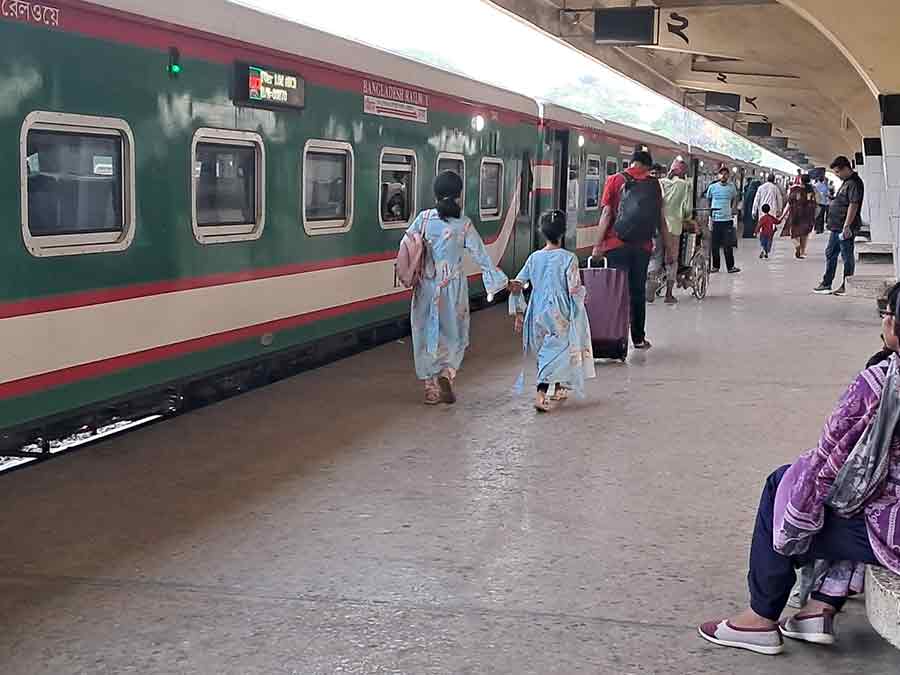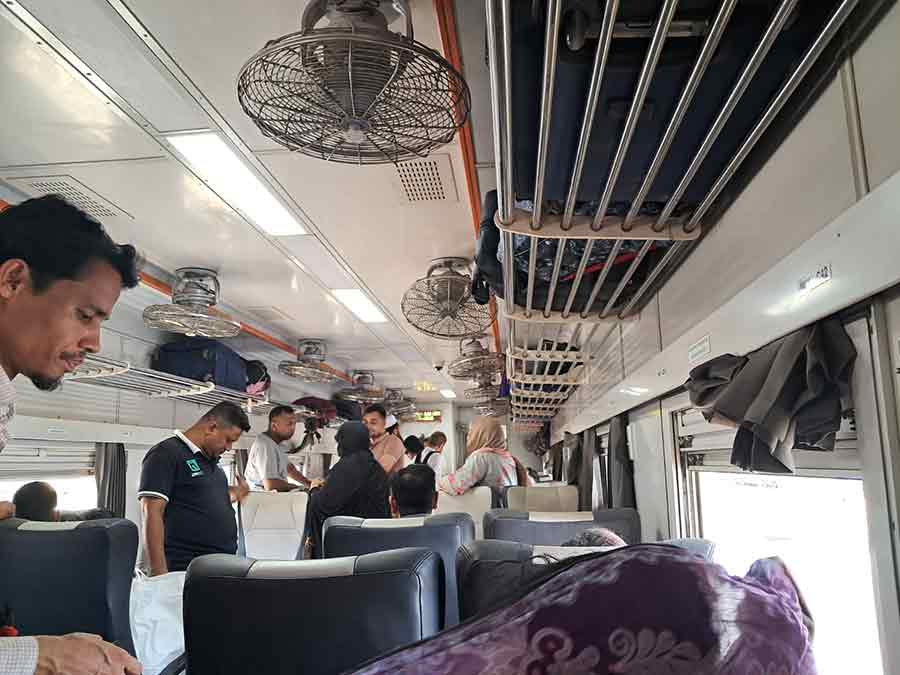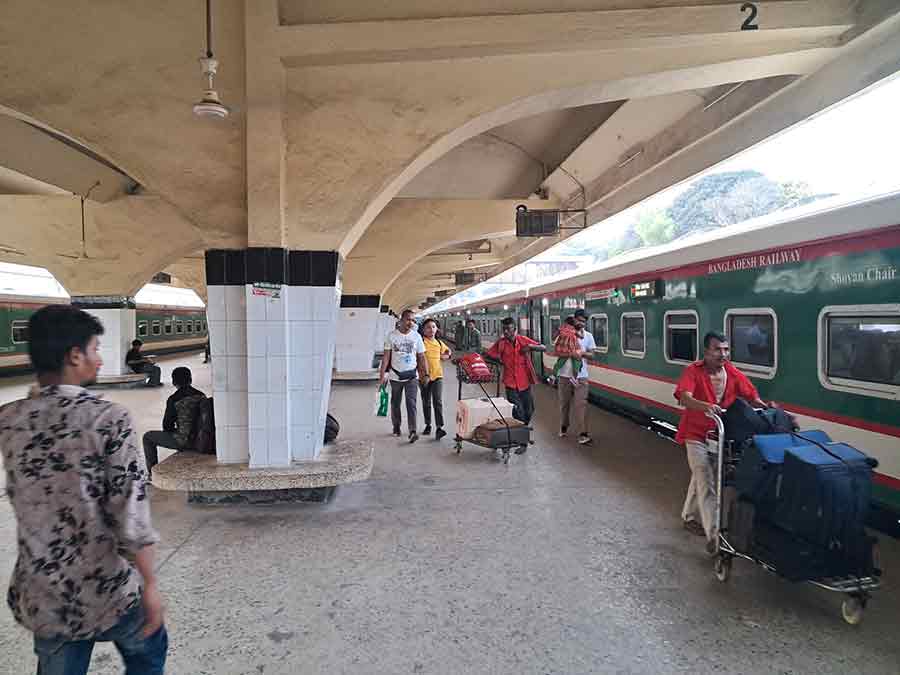
Published :
Updated :

Dressed in black pants and a white coat over a white shirt, a ticket inspector asked for my ticket at the entrance to the platform area, gesturing for me to hurry up. He glanced at the digital ticket when I showed it on my phone and waved me through. Behind me were swarms of travellers, all eagerly waiting in the queue for their turn to step past the collapsible gate.
It was to greet these people that the Kamalapur Railway Station in Dhaka had worn the colour of festivity. Upon my arrival there on March 30, which later turned out to be the day before Eid-ul-Fitr, I saw that bamboo poles wrapped in red- and green-striped fabrics were used to build a scaffold-like structure at the entrance, where Rapid Action Battalion (RAB) and police had set up makeshift booths. Under the vaulted ceiling supported by towering columns of the grand station, a longing for home was in the air amid the babble of crowds.
But I was not going home to share Eid joys with my family. It was a day trip to Chattogram as I had long fancied a train journey on the eve of Eid to witness the mad rush of Dhaka residents to their roots. I had a Sonar Bangla Express ticket, which I had luckily found online while checking the Rail Sheba app on March 28 and booked immediately.
It was half past six in the morning, and the overwhelming presence of the homebound passengers had already amplified the vibrancy of the platform area, which hums around the year. Carrying a variety of luggage, men and women looked for their respective trains, their diverse clothing styles reflecting a mix of socio-economic backgrounds. Dressed in red shirts, Bangladesh Railway porters were in high demand, rushing around the platforms to serve as many clients as they could.

Many families also sat in a huddle on concrete slabs erected around the thick platform pillars, waiting for departures and guarding the children as well as the uneven piles of bags. A man carried his child in a sturdy baby sling while pulling a rolling suitcase, his wife behind him walking fast to catch up. When I was growing up in the late 80s and early 90s, baby slings were not commonplace and parents would mostly carry their toddlers in the shoulder hold position while walking.
“We do not carry straphangers on this train. Plus, you cannot remain standing for the duration of the five-hour journey,” our carriage steward Saikat replied when I asked him before the departure whether the train would be overcrowded because of Eid. Sonar Bangla Express and Suborno Express offer nonstop services between Dhaka and Chattogram, a south-eastern city on the bank of the Karnaphuli River. This means if you do not have a seat, you have to endure the entire journey on your feet, which undoubtedly is impractical.
Saikat was a jovial guy, chatting with anyone who wanted to have a conversation. Like his fellow stewards, he was snappily dressed in a light green shirt and grey pants, complemented by a green tie and black shoes. He pointed at a bunch of folks standing and walking on the roof of a train on another platform, joking that I could go viral by photographing and posting it on Facebook.

The open doors had so far been an invitation to board the train, but it was now time to roll. The train whistled and lurched forward seven minutes behind schedule. From my window seat, I watched the platform crowds fading into the distance and the overly-familiar urban settings taking over the landscape.
It was my first time travelling by the Sonar Bangla Express, and I liked the red-green exterior of the Korean coaches. Inside, the off-white walls and ceiling, together with grey and dark blue seats as well as dark grey curtains, looked austere but offered a certain charm. The cleanliness score was high, while the expansive windows, usually found in vistadome trains, significantly enhanced the travel experience.
I expected a boisterous atmosphere in a packed compartment, but it was the contrary. Around a third of the capacity remained unfilled even after leaving the Biman Bandar station, the only one on the route where the train halts for boarding. Compared to my travels in non-air-conditioned coaches on other routes, I found ours quite calm - no loud talking and no crying of babies.
Having struck up a conversation with my seatmate Mahim, I told him it did not feel like an Eid journey. He opined that perhaps I had boarded the wrong train because the typical Eid rush, characterised by crammed coaches and passengers travelling on the roof, is not common on the Dhaka-Chattogram line. He also observed that the Sonar Bangla Express is a premium train and frenzied Eid journeys are mostly seen on northern routes, such as Rangpur and Kurigram.
The buffet car was several coaches away. Navigating my way from one compartment to another, I noticed that the picture everywhere was almost the same as ours. The uncrowded coaches resulted in a smooth travel experience for all passengers on the sunny day.

On the curved stainless steel counter in the buffet car lay pre-packaged food. The counterman, Emon, said each box contained a piece of fried chicken, a cutlet, and two slices of bread, while water would have to be bought separately. Nothing else was available, except for Pran bottled lassi and Mountain Dew.
Hailing from Kishoreganj, a northeastern district known for its picturesque haors in the monsoon, Emon has been working in railway catering since 2019. He emphasised that not everyone can endure this taxing job. Apart from having irregular sleeping patterns, he is on the move for long hours, which was even longer when he previously worked on the Paharika Express on the Chattogram-Sylhet route.
“Only the Eid day is my holiday. I am getting back to work the following day. I can later go on holiday for a few days. But what is the point of that if I cannot have it during the festival?” he said.
He sleeps on the train, mostly on the dining table or in the chair in the buffet car. As a result, he cannot sleep well. There is no separate coach or arrangement for him to get a good night’s sleep.
“That is a luxury I cannot afford. I am here to work, not to unwind,” he quipped.
Looking out the window, I saw vessels of various sizes on the Meghna River as the train crossed the first Bhairab Railway Bridge. Of the two railway bridges on the Meghna that connect Bhairab and Ashuganj, the first one was built during the British colonial period. The other one built with the Indian Line of Credit (LoC) was opened to traffic in 2017 as part of upgrading the Dhaka-Chattogram route to a double-track line.
While returning to my seat, I encountered the travelling ticket examiner (TTE), who asked for my ticket. After seeing it on my phone, he asked me when I had left my coach and where I had been. He spoke in a commanding tone, as if interrogating a suspect.
This irritated me, and I asked him whether I had the right to walk around the train. He then became very angry and said I was not in my seat when he checked the tickets in our coach. “I was in the buffet car. How do I know when you will check our coach and why is it mandatory for a passenger to be in his seat when you are checking his carriage?” I demanded.
The policeman accompanying the TTE intervened and asked me to proceed to my compartment. This was not the first time I found myself in such a situation. When I was travelling from Panchagarh to Santahar by the Dolonchapa Express during my winter rail adventure in January, the TTE asked me why I was moving around the train.
I told him I am a train travel writer, which requires me to take notes by walking around the vehicle, observing the atmosphere in the compartments, and talking to passengers instead of remaining seated during the entire journey. He looked at me as if I were from another planet. I thought he would want to see my jottings and office ID, but he left without asking more questions.
The Sonar Bangla Express doors are kept closed when the train is running. I stood at one for a while and watched paddy fields through the rounded rectangular window before returning to my seat. Mahim, a native of Chattogram, took an interest in my profession, and I explained the differences between the job responsibilities of a sub-editor and a reporter.
He is a civil engineer, earning his degree from Ahsanullah University of Science and Technology and working at a private construction firm. He likes his job, but the salary has become irregular in recent months. His employer only paid the Eid bonus before the festival, and the February salary was due.
While the large stations on the route had crowds of different sizes, most of the small ones looked empty. Several old stations were refurbished and new ones were also built as part of the Dhaka-Chattogram double-track project. The new ones are elegant, reflecting modern developments in Bangladesh’s British-era railway system, but are not operational yet.
The cool morning air had been pleasant, but it became uncomfortably hot as the sun climbed higher. I caught a glimpse of several Eidgahs (open fields or enclosures where Eid prayers are offered) as the train whizzed past villages and towns. They were bedecked with marquees, ready to welcome worshippers.
We skirted the Indian border at the Kasba station, and further on at Mandabagh and Saldanadi - all three located in Brahmanbaria. Interestingly, Chattogram’s rail connectivity with India’s Assam in the pre-partition period preceded its link with Dhaka. The Chattogram-Akhaura-Kulaura-Karimganj route was built in the 1890s, while the Akhaura-Bhairab-Tongi line, which was connected to the Dhaka-Mymensingh line, was opened in 1910-14.
When Mahim learned that I would leave for Dhaka by the same train at 5:00 pm, he asked me what I would do during the interlude. I had no plan other than visiting Biponi Bitan (better known as Chattogram New Market), just a few minutes from the station. He offered to accompany me, saying he could also spend some time there and we could window-shop.
That sounded cool, but I told him I would have to go to the ticket counter first to buy the return ticket as I could not do so on the app. Alighting at the Chattogram station at 12:30 pm, Mahim and I headed straight to the counter. But I was astounded when they refused to sell me a ticket.
The counterman explained that a national ID (NID) could only be used once to buy up to four tickets for travel in the week before Eid. As I had bought the Dhaka-Chattogram ticket to travel between March 24 and 30 using my NID, I would not be able to purchase another one regardless of the route. The only option was to use someone else’s NID and if I could manage that, they would sell me a physical ticket.
“Does that mean I cannot go back to Dhaka by train if I cannot convince someone to allow me to use his NID for a ticket?” I asked.
“Sort of,” replied the man.
I called one former colleague, but he had already bought Eid tickets. I frantically made the next call to another former colleague and was relieved to know he had not purchased any ticket in the past seven days. When I was finally handed the printed ticket, it felt like striking gold.
Making our way to Biponi Bitan through traffic congestion, Mahim and I discussed what an absurd ticket sale policy it was. They imposed the restriction to prevent ticket scalping before Eid, but the counterman himself suggested I bypass the rule, despite knowing that tickets are not transferable. Plus, it made no sense to sell only one physical ticket to a passenger like me as it was obvious that I was not going to resell it to someone at a higher price instead of returning to Dhaka.
We window-shopped in some punjabi and footwear stores on the ground and second floors of the four-storey mall, pretending we would buy if we liked the merchandise. The crowds comprising mostly youngsters were larger in punjabi shops, while footfall in jewellery stores on the first floor was close to nil. Mahim, who wore a brown crew neck T-shirt and olive green cargo pants, showed me some stores that are popular among shoppers in Chattogram, such as Bangali Babu.
Bidding him adieu, I returned to the station, its spacious hall abuzz with travellers. The ceiling was made of inverse pyramidal panels supported by tall columns, with the afternoon sunlight creating a glow effect along the panel edges while passing through green translucent roofing sheets. Billboards mostly advertised Meghna Group’s Fresh brand products.
Before boarding the train, I saw the policeman, who had intervened in the morning to prevent an altercation between me and the TTE, on the platform. Walking up to him, I asked why the TTE was so angry that I was not in my seat when he had checked our carriage. He politely replied that not everyone reacts the same way and I should let go of it.
The train left Chattogram on time, and I had an aisle seat. Catering workers hawked iftar boxes after a while, urging passengers to buy before stocks ran out. As daylight began to fade, passengers were preparing to break the fast and I could smell a variety of fried items.
Though the Sonar Bangla Express is a non-stop service, it slowed down and even halted briefly a few times for signal clearance during both the inbound and outbound journeys. Wearing headphones, my seatmate binge-watched YouTube videos, his eyes glued to the screen. I went to the buffet car where Emon was serving customers, drank a bottle of Mountain Dew, and fell asleep after getting back to my seat.
Waking up, I learned that tomorrow would be Eid as the Shawwal moon had been sighted. The train halted at the Biman Bandar station, where the majority of the passengers disembarked. The hubbub at the Kamalapur station had died down when we reached there at 10:30 pm, with only a small number of passengers waiting to board the last train home.
r2000.gp@gmail.com


 For all latest news, follow The Financial Express Google News channel.
For all latest news, follow The Financial Express Google News channel.